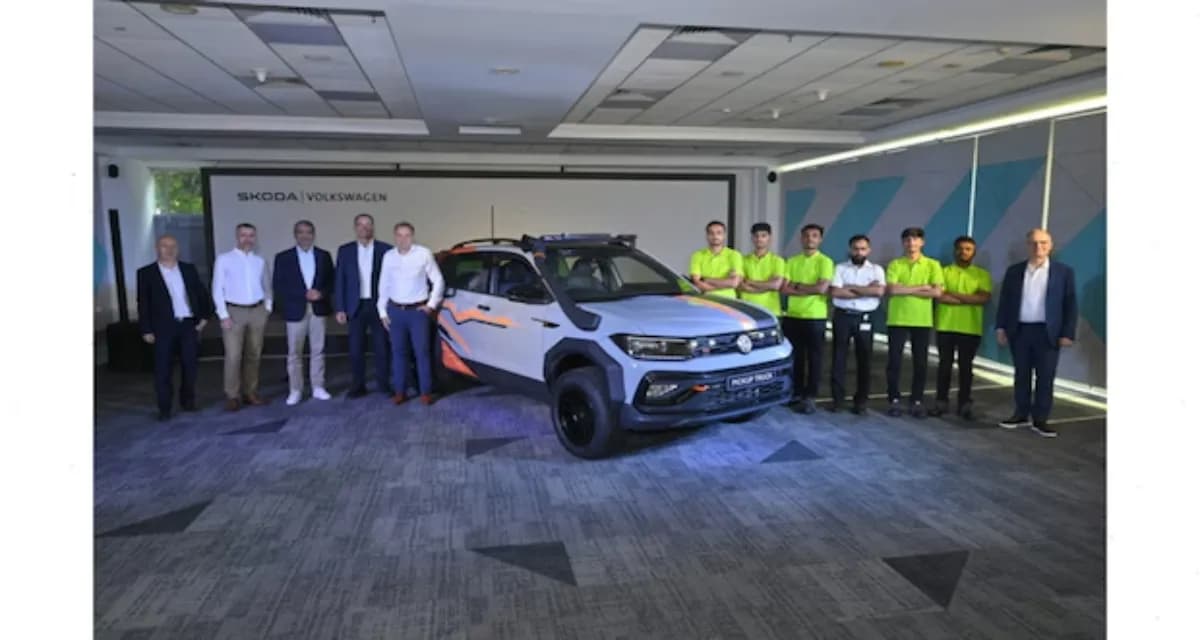Škoda Auto Volkswagen India Private Limited (SAVWIPL) is committed to the government’s ‘Skill India’ initiative through its Student Car Project. This year, the Mechatronics students have created an innovative Pickup Truck by merging a Volkswagen Taigun SUV and a Volkswagen Virtus sedan, showcasing the prowess of the company's vocational program.
Developed by students from the SAVWIPL Academy, this concept pickup truck is a testament to the next generation's innovative thinking. These students, part of the Mechatronics program, spent months refining their design, overcoming challenges, and learning the complexities of automotive engineering. Their goal? To build something unique while gaining hands-on experience.
Creating the Dream Machine: A Nine-Month Journey
The creation of this pickup truck wasn’t just an idea born overnight. It was a meticulous process that unfolded over nine months. Beginning with the initial car concept, the students moved through phases of brainstorming ideas, conducting market research, and working on research and development. Each step required them to dive deep into the automotive world, gathering insights that would shape their final product.
A key feature of their approach was using modern technology. They 3D-printed many parts of the vehicle, a cutting-edge manufacturing technique that added precision and creativity to their build. This not only allowed them to solve complex design problems but also gave them a deeper understanding of how modern car production works. The pickup truck they created is equipped with specialized accessories like underbody protection, rugged studded tires, and custom roof-mounted lights—giving the vehicle a sturdy, off-road look.
A Hands-On Learning Experience
Throughout the project, the students were mentored by professionals from SAVWIPL, who guided them through every stage of development. These mentors offered invaluable advice, helping students interact with suppliers, troubleshoot problems, and bring their vision to life. This level of industry exposure is critical, especially in a field like automotive manufacturing, where theoretical knowledge must meet practical application.
The mentorship provided to these students was more than just technical guidance. It was about instilling confidence, building creativity, and nurturing a problem-solving mindset. SAVWIPL’s approach ensures that students aren’t just learning the mechanics of car building—they’re understanding how to innovate within a structured framework.
Škoda Volkswagen’s Commitment to Skill Development
SAVWIPL’s commitment to education and skill development extends beyond this particular project. Their Mechatronics program, launched in 2011, is modeled after Germany’s renowned vocational training system. The program is a full-time 3.5-year course aimed at high school graduates, offering them the tools to excel in the fast-evolving world of automotive technology. The focus is on fostering a passion for technology while providing students with the technical skills they’ll need to thrive in the automotive industry.
Through projects like this pickup truck concept, the program offers students real-world experience that bridges the gap between classroom learning and practical application. By encouraging young minds to explore, experiment, and innovate, the program plays a crucial role in shaping the future of India’s automotive industry.
A Global Initiative Rooted in India’s Growth
Škoda Auto Volkswagen India’s Student Car Project is part of a larger global initiative led by the Volkswagen Group. Known as the Azubi Student Car Project, this initiative operates under the Škoda Academy umbrella, with a focus on elevating vocational education worldwide. In India, this ties seamlessly into the government’s “Skill India” initiative, which aims to enhance the employability of youth through hands-on training.
Andreas Dick, a key member of the board for Škoda Auto, praised the success of the project in India. According to him, the project demonstrates how young talent can use the latest technology to create industry-leading vehicles. It’s not just about building cars—it’s about creating an environment where young innovators can grow into the leaders of tomorrow. This initiative also highlights India's potential to become a global hub for manufacturing and innovation, a goal that aligns with the government's long-term vision for a "Viksit Bharat" (Developed India).
Driving Innovation into the Future
Piyush Arora, Managing Director and CEO of Škoda Auto Volkswagen India emphasized how initiatives like the Student Car Project are empowering students to shape the future of mobility. By merging their creativity with hands-on learning, students can experiment with new ideas in a supportive environment. Arora firmly believes that programs like these are instrumental in achieving India’s larger development goals.
SAVWIPL isn’t just investing in the future of its students. It’s also contributing to the broader community by aligning with the government’s mission of skill development. By providing local talent with the tools and resources to excel, the company is ensuring that future generations are well-prepared to lead the charge in innovation, both in India and globally.
The creation of this pickup truck by SAVWIPL’s Mechatronics students is more than just a cool project. It’s a powerful demonstration of how practical learning, combined with the right mentorship, can drive real-world innovation. The students didn’t just learn how to build a car—they learned how to think critically, solve problems, and adapt to the demands of a fast-paced, ever-changing industry.
As India continues to rise as a global manufacturing hub, projects like this show how the country’s young talent is not just ready for the future—they’re actively shaping it. By merging education with industry needs, SAVWIPL is helping to cultivate the next generation of innovators, and in doing so, they’re laying the groundwork for a stronger, more advanced automotive sector in India.
Also Read:
